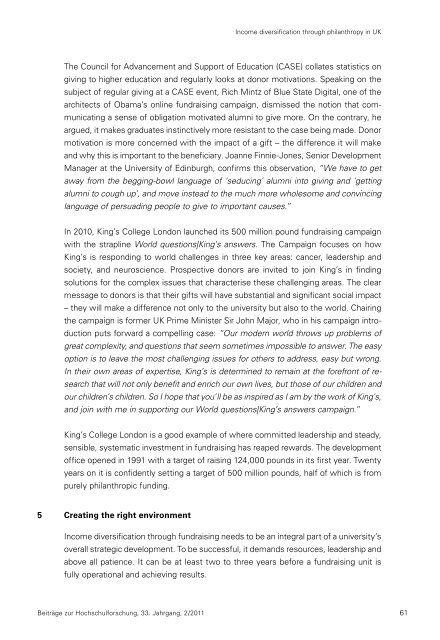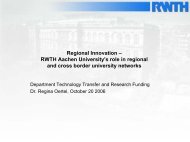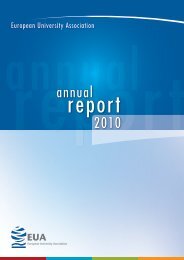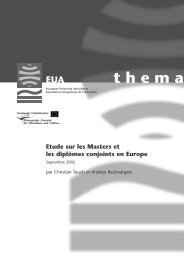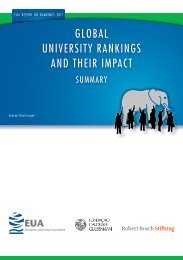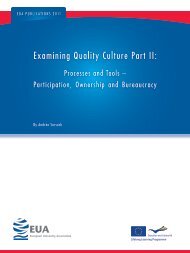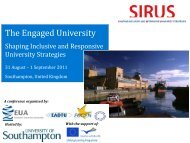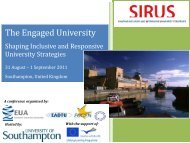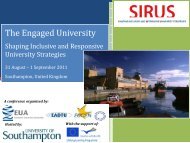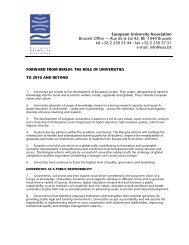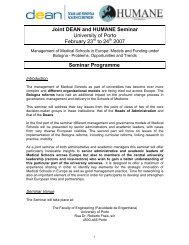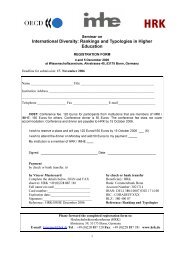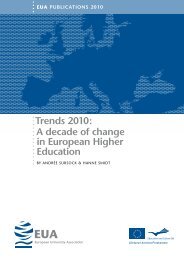Beiträge zur Hochschulforschung - European University Association
Beiträge zur Hochschulforschung - European University Association
Beiträge zur Hochschulforschung - European University Association
You also want an ePaper? Increase the reach of your titles
YUMPU automatically turns print PDFs into web optimized ePapers that Google loves.
Income diversification through philanthropy in UK<br />
The Council for Advancement and Support of Education (CASE) collates statistics on<br />
giving to higher education and regularly looks at donor motivations. Speaking on the<br />
subject of regular giving at a CASE event, Rich Mintz of Blue State Digital, one of the<br />
architects of Obama’s online fundraising campaign, dismissed the notion that com-<br />
municating a sense of obligation motivated alumni to give more. On the contrary, he<br />
argued, it makes graduates instinctively more resistant to the case being made. Donor<br />
motivation is more concerned with the impact of a gift – the difference it will make<br />
and why this is important to the beneficiary. Joanne Finnie-Jones, Senior Development<br />
Manager at the <strong>University</strong> of Edinburgh, confirms this observation, “We have to get<br />
away from the begging-bowl language of ‘seducing’ alumni into giving and ‘getting<br />
alumni to cough up’, and move instead to the much more wholesome and convincing<br />
language of persuading people to give to important causes.”<br />
In 2010, King’s College London launched its 500 million pound fundraising campaign<br />
with the strapline World questions|King’s answers. The Campaign focuses on how<br />
King’s is responding to world challenges in three key areas: cancer, leadership and<br />
society, and neuroscience. Prospective donors are invited to join King’s in finding<br />
solutions for the complex issues that characterise these challenging areas. The clear<br />
message to donors is that their gifts will have substantial and significant social impact<br />
– they will make a difference not only to the university but also to the world. Chairing<br />
the campaign is former UK Prime Minister Sir John Major, who in his campaign intro-<br />
duction puts forward a compelling case: “Our modern world throws up problems of<br />
great complexity, and questions that seem sometimes impossible to answer. The easy<br />
option is to leave the most challenging issues for others to address, easy but wrong.<br />
In their own areas of expertise, King’s is determined to remain at the forefront of re-<br />
search that will not only benefit and enrich our own lives, but those of our children and<br />
our children’s children. So I hope that you’ll be as inspired as I am by the work of King’s,<br />
and join with me in supporting our World questions|King’s answers campaign.”<br />
King’s College London is a good example of where committed leadership and steady,<br />
sensible, systematic investment in fundraising has reaped rewards. The development<br />
office opened in 1991 with a target of raising 124,000 pounds in its first year. Twenty<br />
years on it is confidently setting a target of 500 million pounds, half of which is from<br />
purely philanthropic funding.<br />
5 Creating the right environment<br />
Income diversification through fundraising needs to be an integral part of a university’s<br />
overall strategic development. To be successful, it demands resources, leadership and<br />
above all patience. It can be at least two to three years before a fundraising unit is<br />
fully operational and achieving results.<br />
<strong>Beiträge</strong> <strong>zur</strong> <strong>Hochschulforschung</strong>, 33. Jahrgang, 2/2011 61


